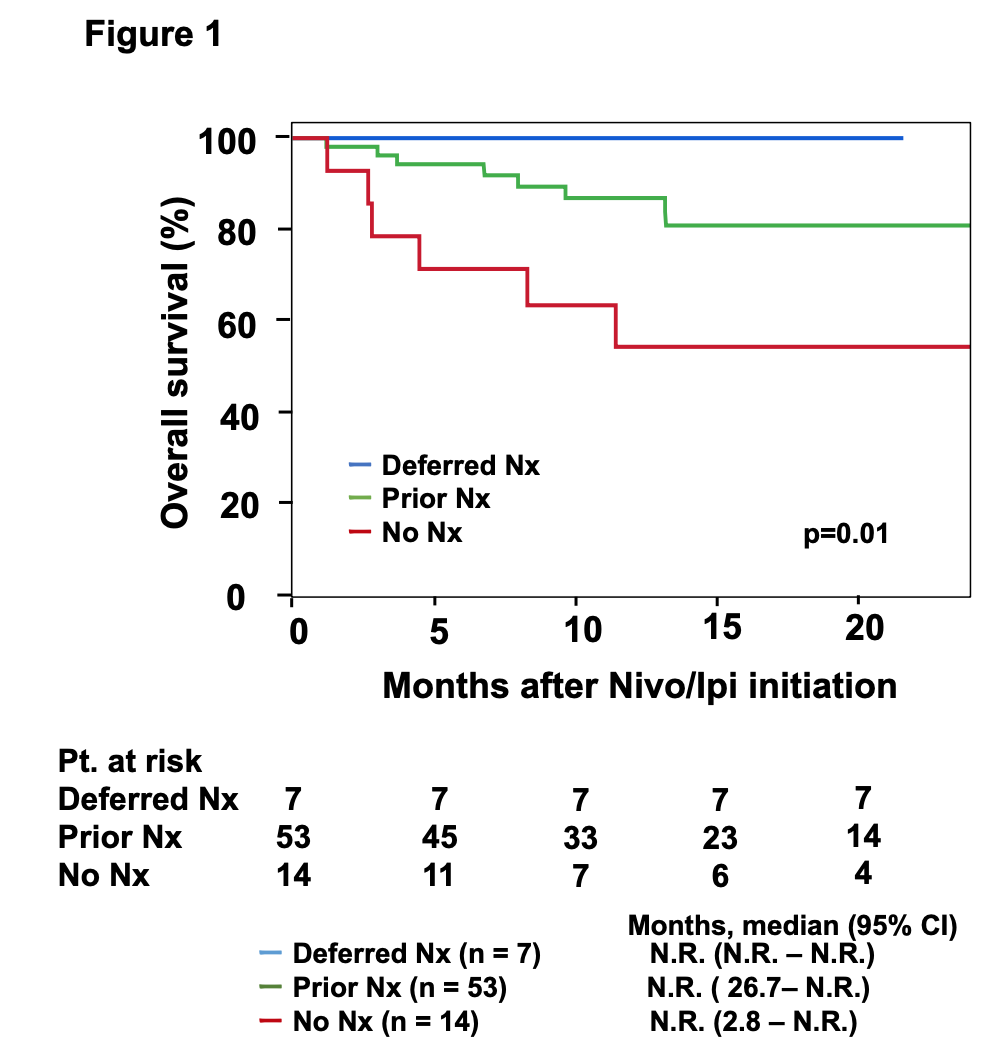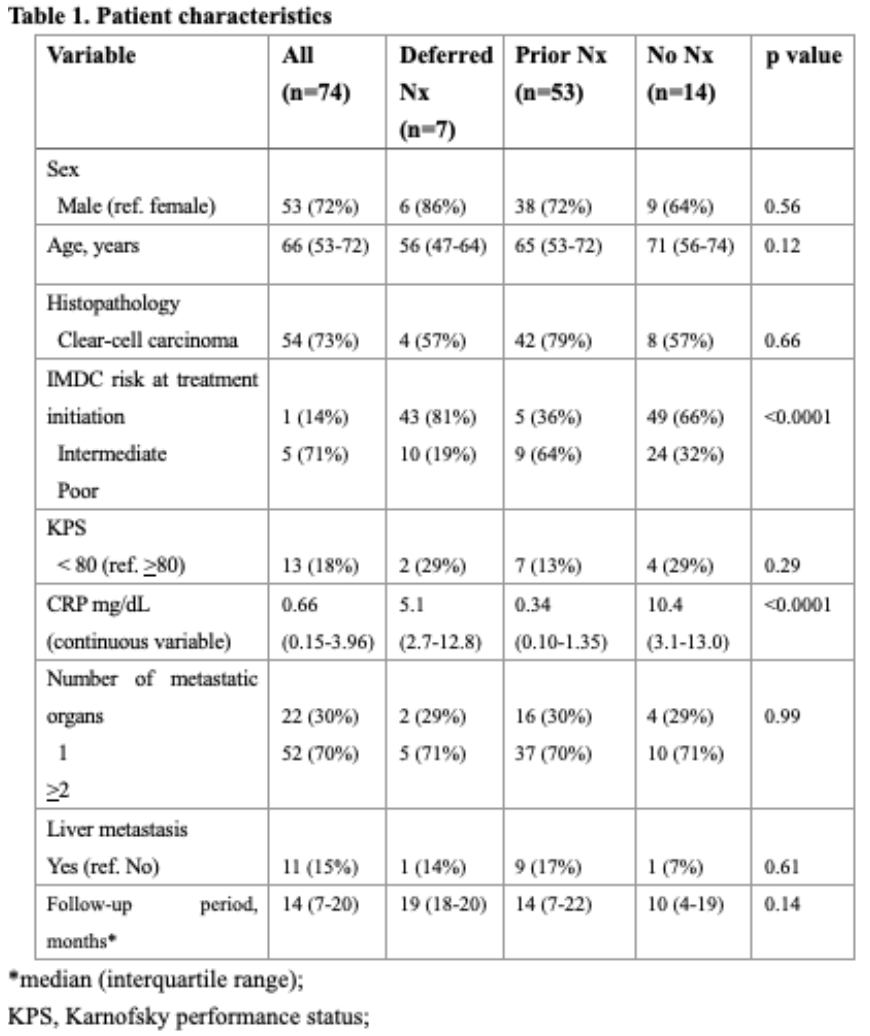Back
Poster, Podium & Video Sessions
Best Poster Award
MP12: Kidney Cancer: Advanced (including Drug Therapy) I
MP12-10: Potential survival benefit of deferred nephrectomy in patients treated with nivolumab plus ipilimumab for metastatic renal cell carcinoma
Friday, May 13, 2022
1:00 PM – 2:15 PM
Location: Room 222
Maki Yoshino*, Hiroki Ishihara, Tokyo, Japan, Yuki Nemoto, Saitama, Japan, Kazutaka Nakamura, Fukushima, Japan, Hidekazu Tachibana, Satitama, Japan, Hironori Fukuda, Kazuhiko Yoshida, Hirohito Kobayashi, Junpei Iizuka, Tokyo, Japan, Shimmura Hiroaki, Fukushima, Japan, Yasunobu Hashimoto, Saitama, Japan, Toshio Takagi, Tsunenori Kondo, Kazunari Tanabe, Tokyo, Japan
- MY
Maki Yoshino, MD
Tokyo Women's Medical University
Poster Presenter(s)
Introduction: he therapeutic role of cytoreductive nephrectomy has been intensively discussed after the CARMENA and SURTIME trials. We aimed to clarify the survival benefit of deferred nephrectomy after frontline nivolumab plus ipilimumab (Nivo/Ipi) for metastatic renal cell carcinoma (mRCC).
Methods: We retrospectively evaluated 74 patients with mRCC who received Nivo/Ipi at our five affiliated institutions. Patients were divided into three groups depending on the nephrectomy status; patients who received nephrectomy prior to initiation of Nivo/Ipi (pNx), who received deffered Nx (dNx), or who have not received Nx (-Nx). Overall survival was compared among the three groups and perioperative outcomes of the dNx group were evaluated.
Results: Of the 74 patients, seven (9%) received dNx, 53 (72%) received pNx, and 14 (19%) have not undergone nephrectomy (-Nx) (Table 1). Deferred Nx was conducted at the median six months after the initiation of Nivo/Ipi. Overall survival was significantly higher in the dNx group than in the pNx and -Nx groups (1-year rate: 100% vs 86% vs 54%, p = 0.01) (Figure 1). Perioperative outcomes were generally not specific, but three patients required blood transfusion (Clavien-dindo Grade II). During the follow-up with median 10 months after dNx, all seven patients were alive; three patients received nivolumab for other targeted lesions, three patients obtained drug free interval, and one patient received subsequent targeted therapy due to apparent disease progression.
Conclusions: Cytoreductive nephrectomy deferred to Nivo/Ipi is a potentially feasible therapeutic option in carefully selected patients.
Source of Funding: None.


Methods: We retrospectively evaluated 74 patients with mRCC who received Nivo/Ipi at our five affiliated institutions. Patients were divided into three groups depending on the nephrectomy status; patients who received nephrectomy prior to initiation of Nivo/Ipi (pNx), who received deffered Nx (dNx), or who have not received Nx (-Nx). Overall survival was compared among the three groups and perioperative outcomes of the dNx group were evaluated.
Results: Of the 74 patients, seven (9%) received dNx, 53 (72%) received pNx, and 14 (19%) have not undergone nephrectomy (-Nx) (Table 1). Deferred Nx was conducted at the median six months after the initiation of Nivo/Ipi. Overall survival was significantly higher in the dNx group than in the pNx and -Nx groups (1-year rate: 100% vs 86% vs 54%, p = 0.01) (Figure 1). Perioperative outcomes were generally not specific, but three patients required blood transfusion (Clavien-dindo Grade II). During the follow-up with median 10 months after dNx, all seven patients were alive; three patients received nivolumab for other targeted lesions, three patients obtained drug free interval, and one patient received subsequent targeted therapy due to apparent disease progression.
Conclusions: Cytoreductive nephrectomy deferred to Nivo/Ipi is a potentially feasible therapeutic option in carefully selected patients.
Source of Funding: None.



.jpg)
.jpg)